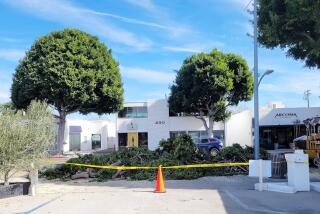Stormy Case Has Sent Her Up a Tree
- Share via
Every lawyer worth his salt should quote Latin once in a while, if for no other reason than to confuse, and thereby impress, his clients. So if the Altadena reader whose neighbor’s tree fell on her car walked into my office looking for legal help, I’d probably grin and say:
“Damnum absque injuria.”
Actually, I don’t understand Latin, but judges who do have used that phrase to explain the legal rule that says where no legal right is impaired, the law gives no relief, however considerable the damage.
Damage to Car
It was a windy, rainy night, and a neighbor’s tree toppled onto the reader’s car, causing about $800 worth of damage. She recognizes that it was an “act of God” that caused the damage, but still wonders whether she could compel her neighbor to pay for it if she sued in small claims court.
In order to win a lawsuit for this type of property damage, a person has to show that the defendant had a legal duty to take reasonable precautions to protect others against injury or damage, breached that duty, and that the breach was the “proximate” or legal cause of the resulting injury. In everyday English, this would be called a negligence lawsuit.
It is the same kind of legal analysis used for a fender bender. First, you show that the other person had a duty to drive carefully and reasonably, that the driver breached the duty by speeding through a red light, and that the breach of duty caused your injury--when the other car slammed into yours.
There are other, less common, legal theories you can use to sue. For example, “strict liability” is imposed without regard to fault for defective products or certain ultra-hazardous activities that cause damage. So if a munitions factory explodes, you may not have to prove negligence.
But in the case of a tree that falls on your car, you’ll probably have to prove negligence. Simply put, you’ll have to show that the neighbor did something wrong or unreasonable. You won’t win your case if you just describe the damage and sit down.
There are some scenarios under which a case of the fallen tree could be successful. For example, if you can show that the neighbor knew the tree was unstable, had been warned about potential problems during windy nights, or built a heavy tree house that caused the tree to lean across your property--hanging, as they say, by a limb--then you might have a case.
That might be true even if an act of God was a partial or concurrent cause of the damage. For example, if a lightning bolt hits a railroad car full of fireworks and causes your nearby car to be engulfed in flames, you probably would want to sue the railroad company. You might win if the fireworks had been stored improperly. But you’d probably lose if the railroad company took all reasonable precautions, because you wouldn’t be able to prove negligence.
Reasonable and Prudent
Does that mean your neighbor has to take extraordinary precautions against acts of God or else be sued? Not really. He’s only required to do what a reasonable and prudent person would do.
In our tree example, it’s likely that a court would consider a winter storm to be a natural foreseeable force, to be reasonably anticipated and guarded against. So the neighbor could lose if he knew the tree was unstable and might fall down during a moderate wind.
But, of course, that’s fairly remote. As long as the neighbor did not act unreasonably or fail to act reasonably, then there’s no legal wrong, and no legal remedy.
And you can’t sue the weatherman or anyone else for the storm.
More to Read
Sign up for Essential California
The most important California stories and recommendations in your inbox every morning.
You may occasionally receive promotional content from the Los Angeles Times.













